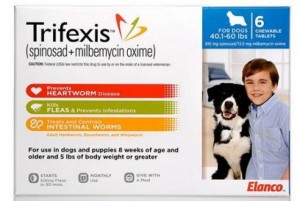
Elizabeth Taylor, a pet owner from Florida, said that she believed she was being a responsible pet owner when she gave her 6-year-old English pointer mix Trifexis, a monthly combination pill made for parasite, flea, and heartworm prevention. Now she feels like she poisoned her own dog.
Taylor says that the first time she gave her dog, Roscoe, the medication he got a little sick, but she didn’t think anything of it. The next time he became extremely ill. She said Roscoe was never the same after the second dose of Trifexis. She said he was cold, shaking, lethargic, shivering, and he had bloody stool and was vomiting.
RELATED: What You Need to Know About Poison Prevention for Dogs
Even after three weeks of round-the-clock care and numerous trips to their veterinarian’s office, Roscoe’s health continued to deteriorate and he eventually needed to be euthanized. After a little research and seeing a television commercial warning dog owners about the side effects of Trifexis, Taylor realized that she was not alone.
There are multiple Facebook pages and numerous posts about Trifexis and the dangerous effects that it can have on dogs. Although the Food and Drug Administration (FDA) approved the drug for use in canines in 2011, they have since received almost 78,000 complaints and over 12,000 reports of dog deaths that owners believe are linked to the medication. The deaths include euthenization cases like Roscoe.

The FDA’s report also lists adverse reactions that are known to be caused by Trifexis – it is 31 pages long. The FDA says that there is no solid evidence thus far that links any canine deaths to Trifexis. They say that the report is simply complaints from veterinarians and pet owners who suspect the drug is to blame.
RELATED: Business and Use of Cannabis in the U.S. Pet Industry: What's the Word?
Local 6, a news station in Florida, contacted Elanco, the maker of Trifexis and were given this statement:
“There continues to be no established link between Trifexis use and death.”
Many dog owners have stated in their comments on social media that they will never use the medication again, and with a wide array of more highly recommended products on the market, why would they? Oral flea, tick, parasite, and heartworm medications are becoming extremely popular among pet owners, and most veterinarians are recommending them as well. Combination pills are also growing in popularity, and Taylor says that she will be much more cautious of any medication that she gives her pets from now on.












